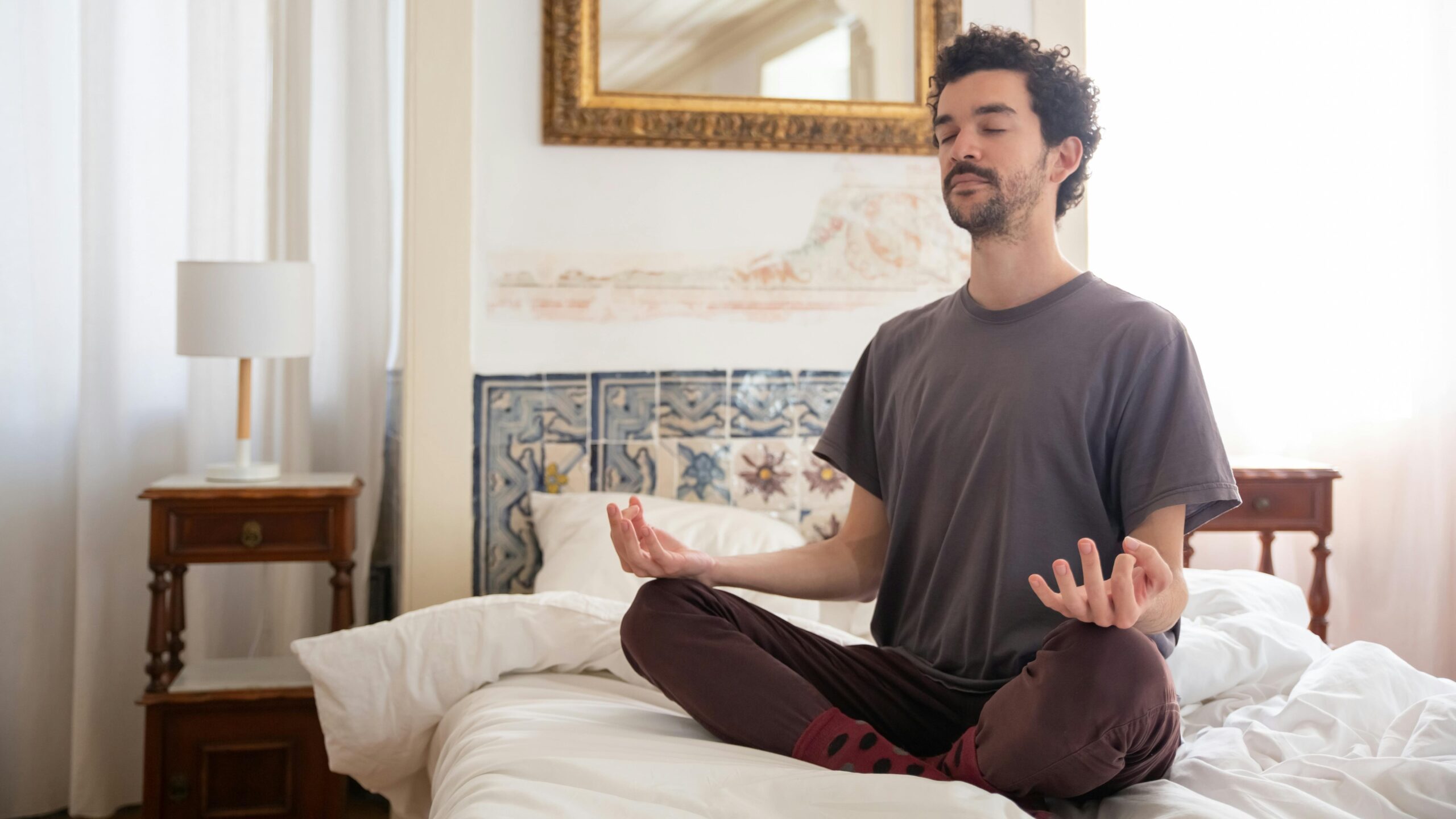Using meditation to improve your personal life is one of the most powerful decisions you can make for your well-being. Meditation is more than just sitting quietly with your thoughts—it’s a transformative practice that helps you connect with yourself, quiet the noise of daily life, and tap into the present moment. In a world that’s constantly pulling you in different directions, learning to use meditation to improve your personal life offers a moment of stillness, clarity, and peace that can transform every aspect of your existence.
When practiced regularly, meditation cultivates a sense of mindfulness, allowing you to become more present, less reactive, and better equipped to handle life’s ups and downs. The benefits are far-reaching—from reducing stress to improving relationships and increasing emotional resilience. If you’re looking for practical ways to use meditation to improve your personal life, this guide will show you exactly how to start and maintain a practice that brings lasting positive change.
Step 1: Understand How Meditation Improves Personal Life
Before diving into practice, it’s essential to understand exactly how meditation to improve personal life works. Research from Harvard Health shows that meditation can be as effective as medication for managing certain conditions. Meditation offers numerous benefits, both physical and mental, that directly impact your personal life:
- Reduced stress and anxiety: Meditation helps calm the mind, reducing the feelings of stress and anxiety that can arise from daily pressures.
- Improved focus and concentration: Mindfulness practices sharpen your ability to stay present and concentrate, helping you accomplish more with greater ease.
- Better emotional regulation: Meditation helps you become more aware of your emotions, allowing you to respond to situations rather than react impulsively.
- Enhanced self-awareness: Meditation invites you to turn inward, gaining a deeper understanding of your thoughts, feelings, and behaviors.
- Improved relationships: By cultivating patience, empathy, and compassion, meditation can improve the way you interact with others in your personal life.
When you meditate regularly, these benefits become more apparent in your personal life, from the way you handle stress to how you engage with your family and friends. Advanced meditation research at Harvard Medical School continues to explore the profound transformative potential of using meditation to improve personal life outcomes.
Step 2: Start with Mindful Breathing to Improve Your Personal Life
One of the simplest ways to begin using meditation to improve your personal life is by focusing on your breath. Breath-focused meditation is a grounding exercise that calms your mind and helps you reconnect with the present moment. According to mindfulness experts, breathing serves as an anchor you can return to whenever stress arises. To begin:
- Find a quiet, comfortable space to sit.
- Close your eyes and take a deep breath in through your nose, filling your lungs.
- Exhale slowly through your mouth, letting go of any tension in your body.
- Continue breathing naturally, focusing your attention solely on the sensation of your breath entering and leaving your body.
When your mind starts to wander (as it naturally will), gently bring your focus back to your breath without judgment. Just allow yourself to be present with the rhythm of your breathing. This simple practice of meditation can be done for just five minutes a day, but over time, it will help you develop mindfulness that can be carried into other areas of your personal life, making this an accessible way to use meditation to improve your personal life immediately.
Step 3: Set an Intention for Your Meditation Practice
Before you begin your meditation session, take a moment to set an intention. An intention is a goal or focus that you carry with you during your practice. It could be something simple, like cultivating peace or letting go of stress, or something more specific, such as working through a difficult emotion or situation in your personal life.
Setting an intention helps you stay grounded during meditation and gives your practice a purpose. If your intention is to reduce anxiety, for example, you can focus on calming thoughts and breathwork during your meditation. If your goal is to improve self-compassion in your personal life, you might repeat affirmations of kindness to yourself throughout the practice.
Step 4: Use Guided Meditation to Enhance Your Personal Life
If you find it difficult to meditate on your own, guided meditation is a wonderful tool for using meditation to improve your personal life. Guided meditations offer verbal instructions, usually recorded by an experienced teacher, that guide you through the process. These can be especially helpful for beginners, as they provide structure and support as you meditate.
You can find guided meditations specifically designed to improve different aspects of your personal life, such as:
- Stress reduction and anxiety management
- Deep relaxation and better sleep
- Improving focus and concentration
- Healing emotional wounds from the past
- Enhancing self-love and compassion
Many apps and websites offer free guided meditations, so you can easily incorporate them into your daily routine. The National Center for Complementary and Integrative Health provides comprehensive information on meditation practices and their effectiveness for improving personal well-being.
Step 5: Cultivate a Consistent Meditation Routine
Consistency is the key to successfully using meditation to improve your personal life. Just like any other habit, the more you practice, the more benefits you’ll experience. Start small and gradually increase the time you spend meditating each day. Aim for at least 10 to 15 minutes a day to start. As you get more comfortable with the practice, you can extend your sessions to 30 minutes or longer.
Incorporate meditation into your daily routine at a time that works best for you—whether that’s in the morning to set a positive tone for the day, during lunch to reset your energy, or before bed to promote restful sleep. Setting a regular time each day helps establish meditation as a habit, and you’ll begin to notice its positive impact on your overall well-being and personal life satisfaction.
Step 6: Bring Mindfulness Into Your Daily Personal Life
Meditation doesn’t have to be confined to your meditation cushion. You can bring mindfulness into everyday activities to further enhance your personal life. Whether you’re eating, walking, driving, or even doing chores, try to be fully present in the moment. This integration of mindfulness throughout your day amplifies the benefits of using meditation to improve your personal life.
For example, when eating, slow down and savor each bite. Notice the flavors, textures, and smells of the food. When walking, pay attention to the sensation of your feet on the ground, the rhythm of your breathing, and the sights and sounds around you. When interacting with loved ones in your personal life, practice active listening and being fully present without distractions.
By practicing mindfulness in everyday moments, you’re reinforcing the principles of meditation and integrating them into your personal life in a meaningful way. This continuous practice of being present strengthens your ability to meditate and brings lasting benefits to every aspect of your personal life.
Step 7: Practice Self-Compassion Through Meditation
As you meditate and grow more aware of your thoughts, you may start to notice negative self-talk or critical inner dialogue. Meditation helps you become more aware of these patterns, and with that awareness, you can begin to replace self-criticism with compassion. Self-compassion research shows that treating yourself with kindness significantly improves mental health and emotional resilience in your personal life.
When you notice negative thoughts, gently challenge them by asking yourself if they are true or helpful. Shift your language to a more supportive and encouraging tone. For example, instead of thinking “I can’t do this,” try reframing it to “I’m doing the best I can, and I’m learning along the way.” This practice of self-compassion is a powerful way to use meditation to improve your personal life by building a healthier relationship with yourself.
Studies in Psychology Today demonstrate that combining stress management with self-compassion leads to greater resilience and emotional stability. This emotional resilience becomes a foundation for all positive changes in your personal life.
Transform Your Personal Life Through Meditation
Using meditation to improve your personal life isn’t a quick fix—it’s a lifelong practice that can bring deep transformation. Whether you’re looking to reduce stress, increase clarity, improve relationships, or develop emotional resilience, meditation provides the tools to help you grow. By committing to regular practice and integrating mindfulness into your daily activities, you will cultivate a deeper connection to yourself and create a personal life of greater peace, purpose, and joy.
Remember, the journey of using meditation to improve your personal life is unique to each individual. Start where you are, be patient with yourself, and allow the practice to unfold naturally. With consistent effort and an open heart, meditation will become a valuable companion in your personal growth journey, helping you navigate life’s challenges with wisdom, compassion, and inner strength. The transformation you seek in your personal life begins with a single breath, a single moment of presence, and the decision to show up for yourself through meditation.

